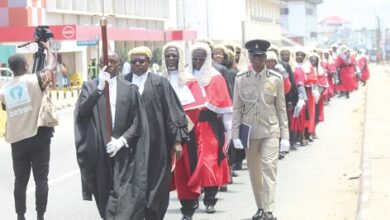
The ‘politics’ of granting bail
Yet again, the media space is awash with comments in respect of the refusal of bail in the ‘Abronye’ trial.
Given the controversy surrounding the decision to refuse bail for Kwame Baffoe, aka Abronye DC, the New Patriotic Party’s Regional Chairman for the Bono Region, it is in order to address it here, given its implications for the rule of law.
Bail is the release of an arrested person, unconditionally or conditionally with sureties, while waiting for the trial to commence.
It is to ensure that the accused person attends the trial.
The bail decision is a discretionary one for the judge but it must be exercised judiciously, normally according to legal principles.
Some of these factors include the seriousness of the offence, the possibility of committing further offences, the likelihood of the accused person absconding, etc.
What was wrong with his Honour Justice Bright Acquah’s decision to remand Abronye DC in custody includes the following:
In his ruling, he seems to be stating that not all persons are equal before the law, and politicians are more equal than ordinary citizens.
This pronouncement, reminiscent of George Orwell’s ‘Animal Farm’, is totally against the dictates of the Constitution and the rule of law.
It is regrettable that a sitting judge can ignore such a fundamental principle.
This grave error is further exacerbated by the Judge quoting Idi Amin, a dictator ‘par excellence’.
Idi Amin, in brutally incarcerating critics of his regime, once said: I can assure you freedom of speech but cannot assure you of freedom after speech.
By seeking to give meaning to this discredited statement, the judge was shredding into pieces accepted democratic principles, as the freedom of the individual is paramount, guaranteed by international human rights treaties and the Constitution.
Another mistake which the judge committed was that he justified the decision to remand Abronye by reference to his own previous rulings where he remanded two persons who had insulted sitting Presidents.
The fact that he had previously remanded the accused persons was wrong and was no justification to repeat the error.
But most glaringly wrong in the judge’s ruling was the fact that he seemed to be using the refusal of bail as a punishment, blatantly against the dictates of statute.
Section 96(4) of the Criminal Offences Act prescribes: a court SHALL not withhold or withdraw bail merely as punishment.
As alluded to above, one of the factors to be taken into consideration in the exercise of a judge’s discretion to grant bail is the seriousness of the offence charged.
Given that Abronye DC’s sins were in the category of misdemeanour, the decision to remand him was ‘harsh and excessive’ – Section 96(3)of the Criminal Offences Act.
Also, the judge seemed to imply that Abronye was a flight risk because he had applied for asylum.
Whilst persons who are a flight risk can be justifiably refused bail, there are conditions that a court can impose which adequately deal with that — ie, the accused depositing his/her passport at the registry of the court.
It is about time that the constitutional right to the liberty of the person, which is intrinsically linked to the granting or refusal of bail, is construed narrowly and purposely to give meaning to the letter and spirit of the Constitution.
Judges’ decisions can be criticised, as long as it is based on legal principles and not contemptuous.
Criticisms of judicial decisions are an essential part of subjecting the judiciary to accountability, given that they cannot be voted out of office if the citizenry are not happy with their decisions.
There are many ways that the judiciary are made accountable by their rulings.
Firstly, within the legal system itself there is the Appellate system whereby superior courts quash decisions of lower courts.
Also, the legal fraternity do subject judicial rulings to scrutiny and, in the process, expose any errors associated with a particular decision.
Also, the press, as the ‘fourth estate’, constantly analyses judgments that are wrong in principle or against social justice.
But by far the most vibrant platform for subjecting judicial decisions to scrutiny is the public forum.
The court of public opinion is always alert and ready to criticise judicial decisions.
Last but not least, the legislature can respond to bad decisions by specifically legislating against such decisions by bringing in new laws.
All these myriad ways of criticising judicial wrong decisions enhance judicial accountability as judges are not elected.
This breeds transparency and engenders improvement in the quality of judicial decisions.




